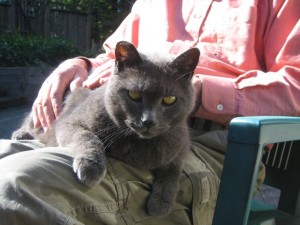
Leo had become, as it were, the telephone through which the humans spoke to one another. He was a large, lazy cat with yellow eyes and a dull gray coat. Save for a few funny tumbles as a kitten, Leo had done very little with any of his nine lives. He had never mated with anything and never killed anything larger than a moth. Yet to Alan and Elizabeth Warrington, he was the most important person in the world.
Alan was seventy. He was tall, and like a bean too long on the vine, had developed a curve in his posture so he loomed over whatever or whomever he happened to be standing near. His face was surprisingly chubby for a man so thin, and he had short white hair, though not in abundance.
Elizabeth, Alan’s junior by three years, was tall, too, with narrow shoulders, wide hips, and large breasts. She kept her gray hair short and refused to put on a dress. She wore slacks, baggy sweaters, and loafers the year round, except in July when she wore sandals; and for someone who sneered as much as she did she was remarkably pretty.
Indeed, her dreadful sneer only subsided when she was sleeping and when she spoke to Leo. Yes, when she spoke to the cat, her sneer would vanish and a melancholic smile would claim her face, staying until she turned away from her pet.
Alan called the cat You, and spoke to him like a gangster. “So it’s You, is it? We’ll see about that, wise guy,” he would say, giving Leo a quick rough massage that would send the little beast into ecstasies of purring and drooling.
Elizabeth called the cat Silly Boy or Mean Mister Leo. She usually spoke baby talk to him, but would occasionally resort to a deep rumbling voice full of mock horror at some impropriety the old cat couldn’t possibly have committed. “Oh you Mean Mister Leo,” she would say, holding the cat in her arms like a baby. “Did you rob that bank? You silliest of silly boys!” And then she would bury her face in his chest.
Then she would put the cat down and Alan would take Leo in his arms and say, “I have to go to the bank today, You. And if I find a list on the counter, I’ll go to the grocery store, too.”
And this was how the Warringtons communicated with each other for eleven years. No one else knew; and it was amazing how easily this was accomplished. Thousands of games of Bridge were played with friends, dozens of guests were entertained, and the Warrington children and grandchildren came to visit week after week, year after year, yet no one ever suspected that Elizabeth and Alan no longer spoke to each other.
Elizabeth couldn’t remember her last direct conversation with her husband. But for Alan, that long ago verbal exchange was so vivid, so charged with emotion, it might have happened yesterday.
They had just gotten home from a lingerie fashion show at a local seafood restaurant. Alan had enjoyed the show, Elizabeth had not. She had, however, enjoyed quantities of champagne and was quite drunk and amorous. Alan, aroused by the lingerie models said, “Those gals were sure cute, weren’t they, Liza?”
To which Elizabeth replied, “A lot you could do about it.”
She tossed the comment off without thinking, but her words hit Alan with the force of a train, their implication stunning him. Elizabeth moved into the kitchen to look for something sweet in the freezer. Alan collapsed on the sofa, choking with rage. Elizabeth returned with a bowl of ice cream and found Alan petting Leo. She approached her husband, put a hand on his knee and said, “Wanna have some fun, sweetie?”
To which Alan replied, “I will never speak to you again.”
“Aw come on, honey,” she cooed. She thought he was teasing. She thought he wanted her to seduce him. “Don’t be mean to mama.”
But Alan wouldn’t look at her. Instead, he glared at the cat and said, “What are you looking at, You?”
∆
And so for eleven years they talked through Leo, transmuting messages meant for each other into things they said to their cat.
Elizabeth’s saying, “A lot you could do about it” may have precipitated the end of their speaking to each other, but those words were not the deeper cause of their rift. Something else had happened a few years before in the midst of a mutual emotional decline. Elizabeth had taken a lover for a few months, her affair barely disrupting the routine of their life. There were a few extra meetings of one auxiliary or another and Alan had never known; and he had always known.
So when Elizabeth said, “A lot you could do about it,” years after her last act of adultery, Alan felt himself being compared, the crime exposed, a punishment necessary.
And what better way to punish a person who loves to talk, lives to talk, than to take away her sounding board, her echo of forty years? What better way to punish infidelity in such a person than to become verbally unfaithful to them, and to remain so, year after year, which is what Alan chose to do, except the gun fired both ways and he was as wounded as she.
∆
Then one morning Leo died. They came upon the body simultaneously, Alan entering the living room from the kitchen, Elizabeth coming from the bedroom. Leo lay on the orange plaid sofa, taut with death, his eyes crossed, his tongue protruding slightly.
Alan grimaced and went to the corpse. Elizabeth clutched her throat, closed her eyes and turned away. Alan confirmed the obvious by placing his hand on the cat’s chest. Elizabeth crossed the room and sat in her blue plaid armchair. Alan remained looming over the corpse, unsure of what to do. His impulse was to put Leo’s body in a plastic bag and put the bag in the garbage can. But maybe Elizabeth would prefer a backyard burial?
“Oh you Mean Mister Leo,” said Elizabeth, pouting. “What a silly thing to do, you silly boy. Now we’ll have to put you in a plastic bag and send you off to the sanitary landfill.”
And so the body was disposed of, but so, as it were, was the telephone. The Warringtons sat in silent terror, overwhelmed by the desperate loneliness their hapless cat had kept at bay for so many years.
Then the actual telephone rang.
Elizabeth snatched it off the table beside her, grimaced at Alan, and cried, “Oh Sandra, oh you dear, you must be psychic. The worst, the very worst thing has happened. Dear Leo just died. Yes, just now. Oh, I know. He was so precious, so good, so… yes, yes, Alan is very sad, too. We just don’t know what to do.”
The phone call over, Elizabeth did battle with her sneer while Alan crossed and uncrossed his legs and picked at his cuticles. Elizabeth cleared her throat several times. Alan coughed. And then, inspired by the same impulse, they began to speak.
“You…” said Alan, but that was all he could manage. The word hung in the air, a questionable thing. Was he speaking to Elizabeth or intoning the dead animal’s nickname?
“I…” said Elizabeth, gripping her knees. “I… I don’t…”
“You…” he said again.
“We have been…” she began.
“A long time,” he said wistfully.
“Yes,” she said, relaxing a little.
“I think you should be sorry,” he said, fighting his tears.
“I am,” she replied, unable to overcome her sneer. “I am. I am. But a man should…”
“Should what?” asked Alan, squinting fiercely at his wife.
“Well… I waited for you to touch me,” she said, her eyes wide with fright. “You were the one who stopped everything.”
Alan smiled demonically and lurched to his feet. “So you did mean it,” he growled. “All these years, you meant it.”
“Meant what?” she cried, shrinking into her chair.
“We’ll see about that, you,” he said, turning away from her.
And then he was gone, the house reverberating with his slam.
“Oh God,” said Elizabeth, covering her mouth with both hands. “Oh God.”
∆
She sat completely still for several minutes, caught in the grip of a memory of when she was a teenager and caught the curtains in the living room on fire while she was smoking pot with a friend, and how her mother would never forgive her. Never.
Finally she roused herself and went into the kitchen to put the kettle on for tea. Then she called her daughter and told her the news of Leo’s death.
“Your father is very upset,” she said, clutching the phone with both hands. “Maybe you could come over. It would be wonderful if you could.”
Her daughter said she couldn’t possibly get over there until tomorrow.
Elizabeth tried to think of who else to call, and while flipping through the address book, she imagined Alan at a pawn shop, buying a gun. Then she imagined her daughter arriving the next day and finding their bodies—Alan having killed himself after he killed her.
But after she played this double death scenario in her mind a few times, she began to think he might not kill himself after he killed her, and that made her furious. To think that he would murder her and then go on living!
“What a self-righteous bastard,” she said, turning off the flame under the whistling kettle and going in search of a weapon.
∆
Three hours passed. Elizabeth waited in the living room. She played a record she hadn’t listened to in twenty years. Ella Fitzgerald singing Cole Porter. A butcher knife lay on the arm of her chair. In the middle of ’S Wonderful, she heard the familiar jangling of Alan’s keys in the lock. She grasped the knife and prepared to lunge.
The door swung open, and there, toddling over the threshold, was a tiny tabby kitten with piercingly blue eyes. Then Alan came in holding another kitten, a luxurious brown.
“I couldn’t decide which,” he said quietly. “So I got both.”
Elizabeth dropped the knife and swooped down on the tabby. “Oh you silliest of silly little kittens,” she said, nuzzling the baby cat.
“You,” said Alan, nuzzling the brown.
Then he set the kitten down and embraced Elizabeth; and she initiated the first kiss.
∆
The kittens explored the house, searching for the cat whose scent was everywhere.
fin





